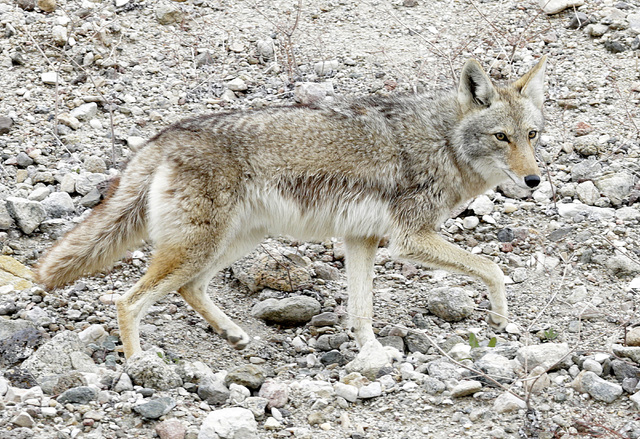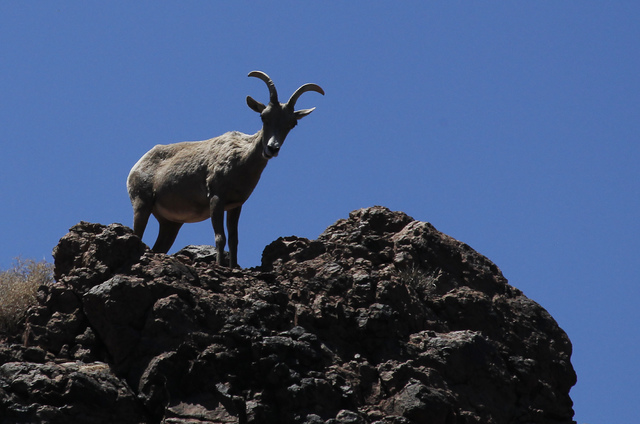Use of hunting fee riles Nevada lawmakers



A debate roared to life at a Nevada Legislature hearing over how a $3 fee earmarked for the killing of ravens, coyotes and mountain lions should be spent.
That fee and the revenue it generates for the Nevada Department of Wildlife’s Predator Management Fund are at the heart of Assembly Bill 101, which the Assembly Natural Resources Committee heard Tuesday. The bill seeks to lift a mandate that requires NDOW to spend at least 80 percent of those funds on the lethal removal of those predators.
But several Republican lawmakers seemed wary of the bill, saying that the mandate was put in place in 2015 because the Wildlife Department was not doing enough to control predacious animals and that it is too soon to determine the mandate’s success.
“We changed in 2015 for a reason,” said Assemblywoman Robin Titus, R-Wellington.
Assemblyman John Ellison, R-Elko, said the predator problems extend beyond big-game management.
“We’ve got coyotes eating people’s puppies in front of their grandchildren,” Ellison said
Assemblyman Michael Sprinkle, the bill’s sponsor, told the committee the bill would not prevent the Wildlife Department from using lethal means. But the mandate handcuffs the state’s biologists by forcing lethal means rather than giving them discretion methods like collaring or trapping and removing, he added.
“We shouldn’t be tying the hands of the experts,” Sprinkle, D-Sparks, said.
The $3 fee, tacked onto big-game hunting permit applications in 2001, generates roughly $500,000 annually. The goal was to boost Nevada’s declining populations of mule deer, bighorn sheep and sage grouse by better managing the predators that feed on them, namely mountain lions, coyotes and ravens.
The 80 percent mandate was added during the 2015 Legislature with support from both sides of the aisle — including Sprinkle, who voted in favor of it.
Sprinkle told the Review-Journal on Wednesday that he didn’t recall voting for the mandate, but he hassince taken a more “active role” in the issue and feels it needs to be removed.
A retired biologist, conservation groups and a rancher from the Carson Valley were among those who testified in favor of the bill. Most echoed Sprinkle’s concern about tying the department’s hands.
Tom Clark described himself to the committee as a hunter and a sportsman who was born and raised in Tonopah. Lifting the mandate, he said, could let the biologists do better research about the causes of the declining populations.
“I think there is a better solution, and I think we should pursue it,” Clark said.
Several who testified against the bill said lifting the mandate less than two years since it went into effect doesn’t give the state enough time to see if it has been effective.
“Where’s the science that warrants any change at all?” asked Mike Reese, president of the Southern Nevada Coalition for Wildlife.
Titus, Ellison and Jim Wheeler, R-Gardnerville, expressed concern about the handling of the bill in the committee in a statement.
They questioned why those testifying from Elko were only allowed to do so via teleconference rather than video conference. They also challenged the speed with which the bill is moving through the committee, with there being just two days between the initial hearing and when the committee could vote on it.
“By pushing this legislation through, it gives the rather unfortunate appearance that this bill has already been predetermined to pass without members of the committee being open to possible amendments,” the statement said.
Natural Resource Committee Chairwoman Heidi Swank, D-Las Vegas, responded to those complaints at the start of the meeting Tuesday, noting that Republicans used similar schedules on bills when the party controlled both houses of the Legislature in 2015.
The bill is scheduled to be heard by the committee again at 1:30 p.m. Thursday. Clark County residents can watch online or in person from the Grant Sawyer State Office Building, 555 E. Washington Ave.
Contact Colton Lochhead at clochhead@reviewjournal.com or 702-383-4638. Follow @ColtonLochhead on Twitter.












